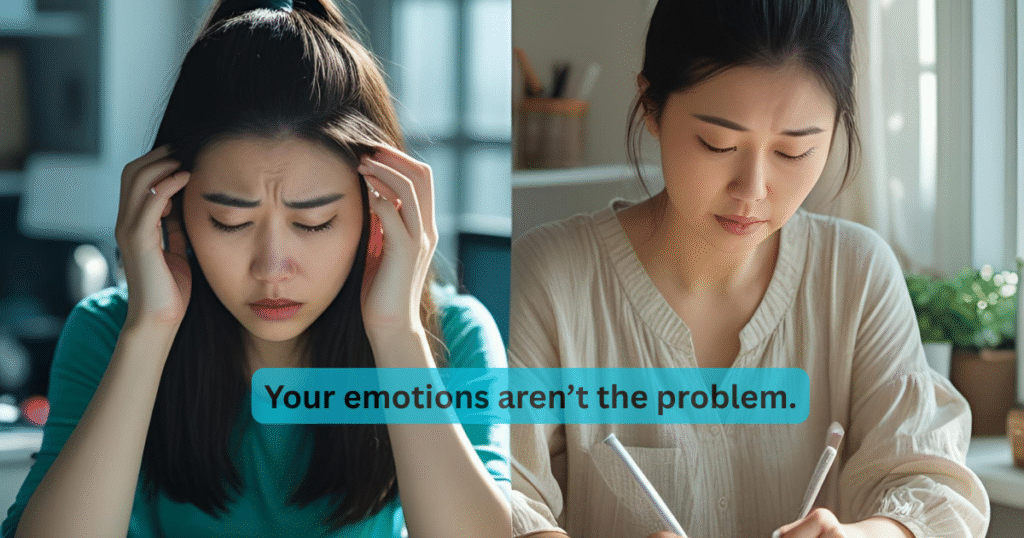That anxiety you keep having? It’s not trying to ruin your life. Here’s what it’s really saying.

What’s Inside
- Why We’ve Been Doing Emotions All Wrong
- Your Feelings Are Like Text Messages
- The Research That Changes Everything
- When Everything Feels Like Too Much
- How to Actually Deal With Your Emotions
- What This Looks Like in Real Life
- Start Here
You know that feeling when your stomach drops before you have to do something really important? Or when you get especially cranky after hanging out with certain people?
Most of us have been taught to ignore these feelings, push through them, or worse—think something’s wrong with us for having them.
But what if your emotions aren’t the enemy? What if they’re actually trying to tell you something important?
Why We’ve Been Doing Emotions All Wrong
Let’s be honest: nobody really taught us how to handle emotions properly. We learned to stuff them down, distract ourselves, or judge ourselves for having them in the first place.
Here’s what nobody told you: emotions are data, not drama.
Think about it like this—when your phone battery gets low, you don’t get mad at the warning. You plug it in. Your emotions work the same way. They’re alerts, not attacks.
The American Psychological Association found that people who actually listen to their emotions make better decisions, have healthier relationships, and feel less stressed overall. Yet most of us are still treating our feelings like they’re the problem.
Your Feelings Are Like Text Messages
Imagine if every time your best friend texted you, you just deleted the message without reading it. Eventually, they’d probably call. Then maybe show up at your door.
That’s what happens when you ignore your emotions. They don’t go away—they get louder.
Your anxiety isn’t randomly attacking you. It’s pointing to something that matters to you. Maybe it’s your reputation, your safety, or your desire to not mess up something important.
That frustration you feel? It’s usually highlighting a boundary that’s been crossed or a need that’s not being met.
Your emotions aren’t random. They’re responding to something real.
The Research That Changes Everything
Dr. Marc Brackett at Yale discovered something wild: people who can name their emotions accurately are 36% more likely to handle tough situations well.
But here’s the kicker—it’s not about having fewer emotions. It’s about understanding what they’re telling you.
Harvard Medical School research shows that when people practice emotional awareness, they experience:
- Way less stress-related symptoms (we’re talking 23% reduction)
- Better decision-making
- Stronger relationships
- More resilience when life gets hard
The goal isn’t to become an emotionless robot. It’s to become fluent in your own emotional language.
When Everything Feels Like Too Much
Sometimes emotions feel overwhelming because we’ve been ignoring them for so long. It’s like letting your laundry pile up for months—eventually, it feels impossible to deal with.
The same thing happens with feelings. When we don’t “do the emotional laundry” regularly, small things can trigger what feels like a massive emotional explosion.
The fix isn’t to stop having emotions. It’s to check in with them more often.
What if you had a simple way to process your feelings without it taking forever or making you feel worse?
How to Actually Deal With Your Emotions
Here’s a framework that actually works (no therapy degree required):
1. Notice What’s Happening Instead of “I’m being crazy,” try “I’m feeling something right now.”
2. Get Curious, Not Critical Ask: “What’s this feeling trying to tell me?” Not “Why am I like this?”
3. Listen for the Real Message Your emotion is protecting something or pointing to something. What might that be?
4. Treat Yourself Like a Friend What would you tell your bestie if they were going through this exact thing?
This isn’t about toxic positivity or forcing yourself to feel better. It’s about becoming curious about your inner world instead of at war with it.
What This Looks Like in Real Life
Emma used to think her work anxiety meant she was bad at her job. When she started listening to what the feeling was actually saying, she realized it was showing her how much she cared about doing good work. Game changer.
Jake’s irritation with his roommate wasn’t really about him constantly leaving his dirty dishes in the sink. It was about feeling disrespected in his own space. Once he understood that, he could have a real conversation instead of passive-aggressive dishwashing.
These aren’t special people. They just learned to decode what their emotions were trying to say.
Start Here
Learning to understand your emotions is like learning any new skill. It gets easier with practice, but you need the right tools.
I created something to help you with this exact process. It’s called “What’s This Feeling Trying to Tell Me?” and it’s a simple reflection sheet that walks you through understanding your emotions step by step.
No confusing psychology jargon. No hours of journaling. Just a straightforward way to figure out what your feelings are actually trying to communicate.
Because here’s what I know: your feelings aren’t inconvenient interruptions to your life. They’re information about what you need, what you value, and what matters to you.
You don’t have to be at war with yourself anymore.
Ready to start understanding what your emotions are really trying to tell you? Get your free copy of the “What’s This Feeling Trying to Tell Me?” reflection sheet and finally make peace with your feelings.
Your emotions aren’t the problem—they’re the solution you’ve been looking for.

Leave a Reply